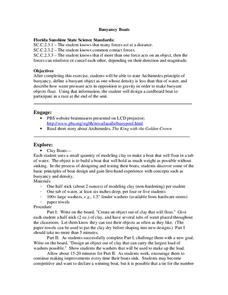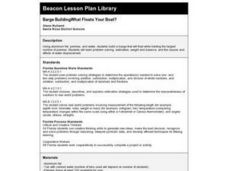Center for Precollegiate Education and Training
Buoyancy Boats
What did the sea say to the boat? Nothing, it just waved. An inquiry-based activity starts with a simple concept on the Archimedes Principle and challenges pupils to make something out of clay that floats. Then, they...
Cornell University
Buoyancy
Swimmers know to float by turning their bodies horizontally rather than vertically, but why does that make a difference? In an interesting lesson, scholars explore buoyancy and the properties of air and water. They test cups to see which...
DiscoverE
Foil Boats
How many pennies can an aluminum foil boat hold? That is the challenge in a collaborative activity designed to explore the concept of buoyancy. Learners use aluminum foil to build makeshift boats and test the weight they hold before...
Teach Engineering
What Floats Your Boat?
Clay's as good a material as any to build a boat, right? An introductory lesson sets the stage for two activities associated with buoyancy. The first involves building boats out of clay, while the second uses these boats to measure the...
National Sailing Hall of Fame
How a Sailboat Works: Hull Speed and Buoyancy
How can you determine the maximum speed of a sailboat? A sailing presentation included with a straightforward lesson plan prompts learners to calculate the maximum speed of a sailboat with a displacement hull. The...
Curated OER
Buoyant Boats
Students design and construct a boat out of aluminum foil and a few other simple materials. The boats then be tested by floating them in water, then adding mass until they sink. They explore the various shapes of boat construction.
Curated OER
Creating the Ideal Cargo Boat
Students build boats out of clay to test the buoyancy of the boat in water. Students break into pairs and construct their boat to specific guide lines, then experiment with their boat in the water.
Curated OER
Barge Building: What Floats Your Boat?
Students construct aluminum foil boats that float while holding the greatest number of pennies. They investigate the concept of water displacement, record their results, and watch a Bill Nye video on buoyancy.
Alabama Learning Exchange
Who Sank the Boat?
Fifth graders experiment with student-made aluminum boats to test for buoyancy. They design a boat and determine how many marbles it takes to sink it while recording their data in a spreadsheet. They design a graph using the data and...
Curated OER
Sink or Float?
Have your class explore density and buoyancy using this resource. Learners read the book Who Sank the Boat, and use several items, such as rubber balls, bottle caps, wood, and other household items to conduct an experiment. Using a tub...
Curated OER
Physical Science- Sink or Float?
Learners investigate which objects sink and which ones float. Learners engage in an experiment, make predictions, and record results on a graphic organizer. This is a comprehensive and easy to follow resource.
Curated OER
Sink or Float
Using a variety of objects, learners conduct buoyancy experiments. They make predictions on which object will sink or float and test their predictions. They use a graphic organizer to record their findings.
Curated OER
I've Got That Sinking Feeling
Students design a simple boat and predict how much weight it can carry. They should also discover why objects float or sink and how this can be determined experimentally. A great lesson on buoyancy!
Curated OER
Sink or Float?
Young scholars make and test predictions about sinking and floating, and classify objects according to whether they sink or float.
Curated OER
Build Your Own Submarine
Students construct their own submarine following a certain procedure. In this physics lesson, students calculate the density of objects using a mathematical formula. They explain why some object floats in water while some do not.
Curated OER
Sink or Float?
Learners will determine whether various objects sink or float in water. They do not need to explain why objects sink or float. They are rather to be encouraged to observe that the same objects will sink or float every time, i.e., that...
TeachEngineering
Teach Engineering: Estimating Buoyancy
Students learn that buoyancy is responsible for making boats, hot air balloons and weather balloons float. They calculate whether or not a boat or balloon will float, and calculate the volume needed to make a balloon or boat of a certain...
Alabama Learning Exchange
Alex: Who Sank the Boat?
This lesson teaches the concept of measurement using grams and ounces through a student-created experiment. The students will get to test their own scientific predictions by constructing a boat and trying to sink it. This lesson provides...
Alabama Learning Exchange
Alex: Teaching Measurement: Literature and Manipulatives
The tradebook, Who Sank the Boat? by Pamela Allen, is an excellent tool in teaching measurement. Students will engage in activities involving different types of measurement. In the story, five animal friends decide to take a boat ride....


















